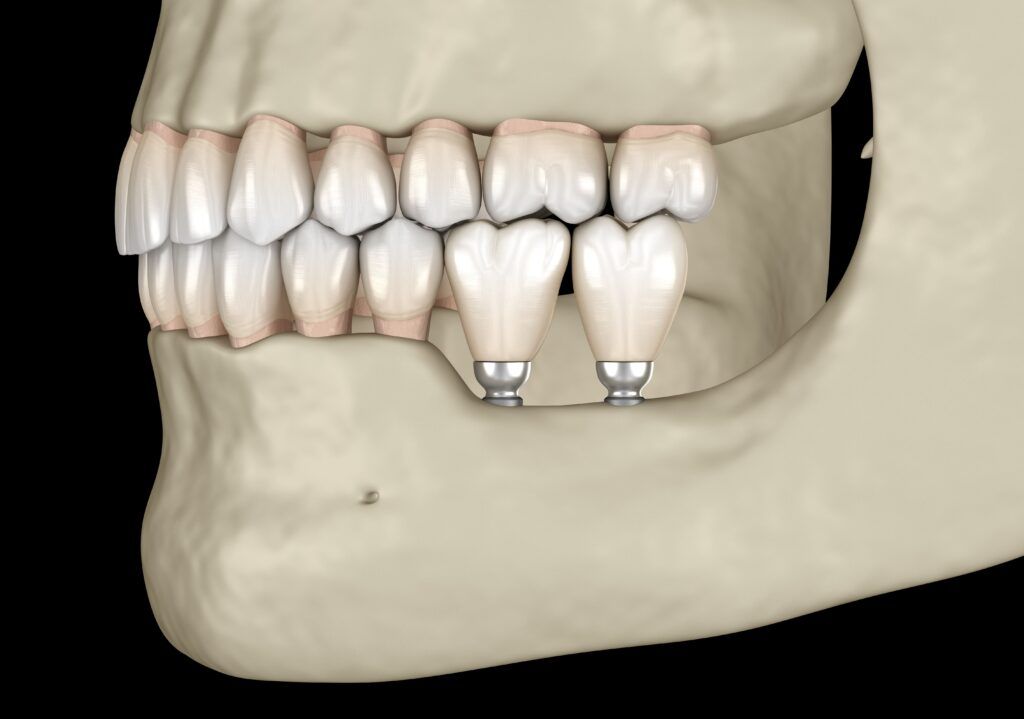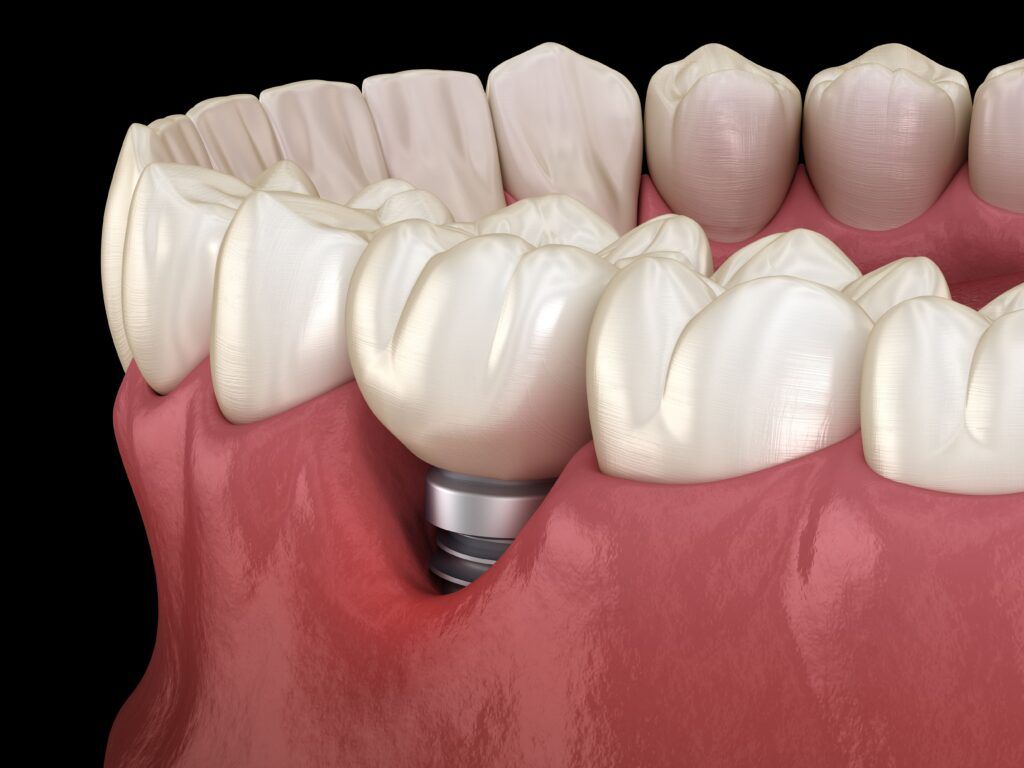
[ad_1]
Dental implants have develop into a well-liked and efficient resolution for changing lacking tooth, providing a useful and aesthetic restoration. Nevertheless, it’s important to grasp that sure medicines can considerably influence the success of dental implants. This weblog explores how numerous medicines can have an effect on dental implants, providing insights for these contemplating or already having this dental process.
Understanding Dental Implants
Earlier than delving into the consequences of medicines, let’s briefly perceive what dental implants are. A dental implant is a titanium put up surgically inserted into the jawbone, mimicking the basis of a tooth. Over time, the implant integrates with the bone, a course of often known as osseointegration, offering a secure basis for a alternative tooth or bridge. Nevertheless, sure medicines can considerably influence this course of and the general well being of dental implants. Subsequently, it’s important for sufferers to tell their dental professionals about their treatment historical past to make sure one of the best outcomes for his or her dental implants.
Drugs That Have an effect on Bone Therapeutic
Bisphosphonates
Bisphosphonates are a category of medication primarily prescribed to strengthen bones and stop bone loss in situations like osteoporosis, Paget’s illness, and in some instances, to deal with bone most cancers. These medicines work by inhibiting osteoclasts, the cells answerable for bone resorption, thereby lowering bone turnover. Whereas helpful for bone well being normally, this mechanism can adversely have an effect on dental implants. The method of osseointegration, important for the soundness and success of dental implants, relies on a wholesome stability of bone formation and resorption. Bisphosphonates, by disrupting this stability, can impair the mixing of the implant with the jawbone. Furthermore, these medicines have been related to a uncommon however severe situation known as osteonecrosis of the jaw (ONJ), particularly after invasive dental procedures like implant surgical procedure. This situation includes the loss of life of jawbone tissue, probably resulting in implant failure and issues in therapeutic. Thus, sufferers on bisphosphonate remedy ought to inform their dental surgeons earlier than present process implant procedures to appropriately plan and handle their remedy.
Steroids
Steroids, significantly corticosteroids, are extensively used medicines for his or her potent anti-inflammatory and immune-suppressing results, usually prescribed for situations like autoimmune ailments, bronchial asthma, and allergic reactions. Nevertheless, their influence on dental implants might be important. Steroids have a identified facet impact of impairing bone development and regeneration, which is an important issue within the success of dental implants. The method of osseointegration, the place the implant integrates with the jawbone, is important for the soundness of the implant. Steroids can intervene with this course of by lowering bone density and slowing down the therapeutic course of, thereby growing the danger of implant failure. Moreover, long-term use of steroids can result in a discount within the immune response, probably growing the susceptibility to infections post-surgery, which is a crucial interval for implant success. Subsequently, sufferers who’re present process or contemplating dental implant surgical procedure and are on steroid remedy ought to talk about their treatment routine with their dental surgeon to evaluate and mitigate potential dangers to implant success.
Chemotherapy Medicine

Chemotherapy medication, used within the remedy of varied cancers, can have a profound influence on the success of dental implants. These potent medicines goal quickly dividing cells, a attribute of most cancers cells, however in doing so, in addition they have an effect on different quickly dividing cells within the physique, together with these very important for therapeutic and bone regeneration. This could result in a compromised bone therapeutic course of, important for the osseointegration of dental implants. Osseointegration is the method the place the implant fuses with the jawbone, offering the mandatory stability for the implant. Chemotherapy may also impair the immune system, growing the danger of infections, which is a crucial concern throughout the surgical placement of implants and the therapeutic part that follows. Furthermore, sure chemotherapy medication could cause modifications within the mouth’s mucosal lining, resulting in soreness and ulcers, additional complicating the dental implant course of. Subsequently, it’s essential for sufferers present process chemotherapy to have an intensive session with their dental surgeon and oncologist to time the implant process appropriately and to take obligatory precautions to reinforce implant success and reduce issues.
Proton Pump Inhibitors (PPIs)
Proton Pump Inhibitors (PPIs), generally used to deal with acid reflux disease and peptic ulcer ailments by lowering abdomen acid manufacturing, may also have implications for dental implant success. Whereas these medication are efficient for his or her supposed use, they’ve been related to a lower in calcium absorption within the intestine as a result of decreased acidic setting. This could probably result in a lower in bone density, a crucial issue for the soundness and longevity of dental implants. A decrease bone density can impair the method of osseointegration, the place the dental implant integrates with the jawbone. Furthermore, PPIs have been linked to an elevated danger of fractures, together with these of the jaw, which may complicate each the implant surgical procedure and the therapeutic course of. Moreover, a discount in abdomen acid can alter the oral microbiome, probably growing the danger of gum illness, which is detrimental to implant well being. Subsequently, sufferers on long-term PPI remedy contemplating dental implants ought to talk about their treatment use with their dentist or oral surgeon to evaluate any potential dangers and take into account acceptable methods to make sure implant success.
Selective Serotonin Reuptake Inhibitors (SSRIs)
Selective Serotonin Reuptake Inhibitors (SSRIs), a category of medication extensively used to deal with melancholy and nervousness problems, can have an surprising influence on the success of dental implants. These medicines work by growing serotonin ranges within the mind, which helps enhance temper. Nevertheless, current research have urged that SSRIs may additionally intervene with bone metabolism. Serotonin performs a job in bone density regulation, and the alteration of serotonin ranges as a result of SSRI use may probably have an effect on bone well being. That is significantly related for dental implants, the place the soundness and integration of the implant rely closely on the standard and density of the jawbone. Sufferers on SSRIs would possibly expertise slower bone therapeutic or decreased bone density, each of which may compromise the method of osseointegration, the crucial part the place the implant fuses with the bone. Moreover, SSRIs have been linked to an elevated danger of bleeding, which may pose challenges throughout implant surgical procedure and restoration. It is crucial for people on SSRIs to reveal their treatment use to their dental professionals when contemplating dental implants, in order that potential dangers might be assessed and managed appropriately to reinforce the success of the implant process.
Drugs Affecting Gum Well being
Anticonvulsants, Calcium Channel Blockers, and Immunosuppressants
Anticonvulsants, calcium channel blockers, and immunosuppressants, whereas important for managing numerous medical situations, can pose challenges for dental implant success as a result of their influence on gum well being. Anticonvulsants, generally used for seizure management, and calcium channel blockers, prescribed for hypertension and coronary heart situations, are identified to trigger gum overgrowth or hyperplasia. This extreme development of gum tissue can complicate oral hygiene, improve the danger of gum illness, and create difficulties within the placement and upkeep of dental implants. Equally, immunosuppressants, essential for stopping organ rejection in transplant sufferers, can result in related gum overgrowth and heighten the danger of infections across the implant website. That is significantly regarding as it might result in peri-implantitis, an inflammatory situation that impacts the tissues surrounding the implant and may jeopardize its stability and longevity. Subsequently, sufferers on these medicines require cautious monitoring and administration by dental professionals to make sure the well being of the gums, which is integral to the success of dental implants.
Oral Contraceptives
Oral contraceptives, generally used for contraception, can have a noteworthy influence on dental implant success as a result of their affect on gum well being and bone metabolism. These contraceptives, which comprise various ranges of estrogen and progesterone, can alter the hormonal stability within the physique, resulting in elevated gum sensitivity and a heightened inflammatory response. This hormonal fluctuation could make the gums extra prone to irritation and bleeding, situations which might be conducive to the event of gum illness. Within the context of dental implants, this heightened gum sensitivity and potential for elevated irritation can complicate the therapeutic course of post-implant surgical procedure and should have an effect on the soundness and integration of the implant with the jawbone.

Selective Serotonin Reuptake Inhibitors (SSRIs)
Other than their results on bone density, some antidepressants could cause dry mouth, lowering saliva circulation which is important for neutralizing acids and cleansing away meals particles. This could result in elevated plaque accumulation, gum illness, and probably have an effect on dental implant well being.
Blood Thinners
Blood thinners, corresponding to warfarin and aspirin, that are prescribed to stop blood clots and handle coronary heart and circulatory situations, can pose particular challenges for dental implant procedures. These anticoagulant medicines improve the danger of bleeding, a major concern throughout any surgical process, together with the location of dental implants. Extreme bleeding can complicate the surgical course of, making it tougher for the dentist to regulate the positioning and probably impacting the fast post-operative therapeutic part. Furthermore, the elevated bleeding tendency may also result in a better danger of post-surgical issues corresponding to hematoma formation or extended therapeutic occasions, each of which may have an effect on the osseointegration course of – the crucial part the place the dental implant integrates with the jawbone.
Antibiotics
Antibiotics, extensively prescribed for bacterial infections, can have a twin position within the context of dental implants, each helpful and probably difficult. On the optimistic facet, antibiotics are sometimes prescribed following implant surgical procedure to stop an infection, making certain that the implant website stays wholesome and conducive to therapeutic and osseointegration. That is significantly essential as any an infection can considerably hinder the implant’s means to correctly combine with the jawbone. Nevertheless, on the flip facet, sure antibiotics can disrupt the pure stability of the oral microbiome. This disruption can result in an overgrowth of dangerous micro organism, growing the danger of oral infections, together with those who have an effect on gum well being. Poor gum well being is a significant danger issue for peri-implantitis, an inflammatory situation that may result in the failure of dental implants. Moreover, some antibiotics might work together with different medicines, affecting their efficacy or resulting in undesirable negative effects, which may complicate the general well being standing of the affected person.
Implications for Dental Implant Candidates
If you’re contemplating dental implants, it’s essential to reveal your full medical historical past and present medicines to your dentist or oral surgeon. This info will assist them assess your suitability for implants and tailor the remedy plan accordingly. They could additionally work along with your doctor to regulate medicines briefly if potential.
Conclusion
Whereas dental implants are a viable resolution for a lot of, the influence of sure medicines can’t be ignored. Understanding and managing these results are key to making sure the long-term success of dental implants. All the time seek the advice of along with your dental and well being care professionals to make knowledgeable selections about your oral well being.
[ad_2]